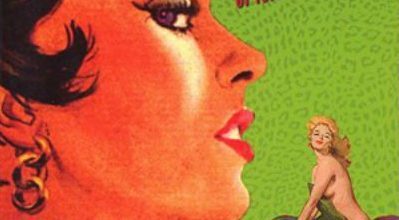And the journey begins…
I was working as a library assistant in a UK university library when I first saw a copy of Ann Bannon’s ‘Odd Girl Out.’ That was the first time I had heard of Bannon or even ‘Lesbian Pulp Fiction’. The cover was drenched in 50’s kitsch even though it was modern day reprint and the illustration of a brooding dark haired female overlooking a pretty naked blonde, left me under no illusion that this book was about women like myself!
Now, pulps are celebrated and studied as part of a lesbian literary canon, but in their first publishing boom, they were considered cheap, trashy and a warning against ‘non-traditional’ lifestyles. However, their sales figures contradicted this ideology as they were selling at a phenomenal rate. Authors, mostly writing under pseudonyms, were enjoying the surprising sales of these books and the market that was generated for them. Encouraged by this, Bannon wrote to another pulp author, Vin Packer, for advice on her stories. Vin introduced Bannon to her editor, Dick Carroll, and he told Bannon to rewrite the novel with the two lesbian characters as the main plot. Surprising as this was, Bannon did just that, and the book was a huge success, becoming the best selling paperback of 1957.
Odd Girl Out was the first novel in the Beebo Brinker series, named after a character who would appear in later novels. However, the first book tells the story of Laura, a college student, who falls in love with Beth, her college roommate. At first scared of Beth’s reaction, Laura finds the courage to tell her how she feels and their love blossoms. This first book in the series charts their story and Laura’s first experiences of same-sex attraction.
When reading the novel for the first time, I was amazed by how bold Laura is, and Bannon as an author, to be so firm in the knowledge of who she is. Whilst I found her behaviour frustrating in later novels, Laura knows that she loves Beth and becomes sure that their love can stand any test. Beth’s own indecision however places barriers in the way.
I went onto read all the novels in the series and to study them for my postgraduate dissertation, alongside many other pulp novels. However the Beebo Brinker chronicles were always the ones that stuck out for me. Bannon’s message is one of hope and courage, that no matter what the challenge is, you can be who you are and venture forth to find your own community. Bannon writes herself that she was amazed to find that in later years, these novels are cherished by readers still. However these books must have given hope to women who had no other representation. Bannon, along with a small collection of pulp writers, managed to curve the niche of writing ‘pro-lesbian’ pulp fiction novels that offered an escape, not a judgement. I think we can all be thankful for that gift whatever era we are born in.
